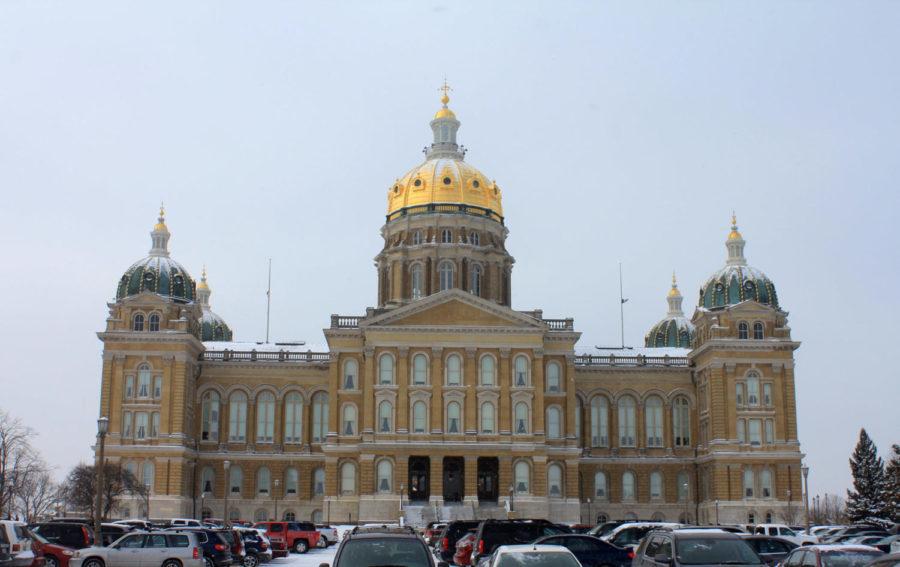University funding talks continue at Iowa Legislature
March 30, 2016
Funding for the three regent universities remains one of the key issues to be decided on by the state legislature, potentially affecting tuition freeze for the next academic year.
The tuition freeze approved by the Board of Regents last December was “conditional”, pending funding support from the state legislature.
“Most of the focus from here on now is going to be on the budget bills,” said Sen. Herman Quirmbach, D-Ames and vice-chair of the Education Appropriations Subcommittee. “I have my fingers crossed; hopefully, we can come out of the session with something to be proud of. Right now things are up in the air.”
Legislators are hoping to pass all proposed legislation before April 19, the last projected day of the session.
Higher education funding
The Education Appropriations Subcommittee is still in the process of deciding funding for the three regent universities. The board had requested a $20 million increase, in addition to more than $507 million in recurring appropriations. In his budget plan, Gov. Terry Branstad approved a little less than $8 million.
“We are starting work on the education appropriations bill, which funds the universities,” Quirmbach said. “We are going to try to provide them as much funding as we can. We want to minimize or eliminate any tuition increase.”
After a hiatus lasting more than a month, he said talks have resumed on this issue. Quirmbach said a few hearings have already taken place on the Educations Appropriations Subcommittee. Presidents from the three regent universities have also made their case for increasing higher education funding.
“Many Republicans tend to assume that the regents institutions are influenced too much by faculty, staff and students who have a more liberal/progressive orientation,” Mack Shelley, university professor of political science, wrote in an email. “There is a strong feeling on those campuses that the Republican leadership wants to reign in the ability of those groups to have influence by keeping funding levels down and by imposing limitations on their ability to have impacts on decision-making.”
He added that higher education funding is a partisan issue between Democrats and Republicans as it involves spending and raising taxes on individuals and families.
“I’ll guarantee you the [approved] amount won’t be as much requested by the Board of Regents because we don’t have the money,” said state Sen. Tim Kraayenbrink, R-Fort Dodge, a ranking member of the Education Appropriations Subcommittee.
Kraayenbrink said even though education is important, the state legislature has to balance it against other important state expenses.
“The farm economy has slowed,” Kraayenbrink said. “There’s not as much revenue coming in. We are going to have to start choosing where we spend our money,”
He added that increased spending without sufficient revenue could affect the state’s fiscal health.
Other key legislative developments include:
Medicaid oversight
Branstad has pursued his decision to allow private firms to manage Medicaid in the state. The decision has been controversial even as the governor claims that this move could save the state millions of dollars in managing health care for the poor and elderly. The program has an annual cost of more than $4 billion.
“This has been one gigantic mess,” Quirmbach said. “There are a lot of people in the state whose lives literally depend on getting critical medical care.”
He added that some Democrats wanted to stop this transition and keep the state-run system. Several Democrats in the legislature have called for vigorous state oversight on this new system.
“We at least want some oversight,” Quirmbach said. “But we haven’t had much co-operation from the House Republicans.”
A bill passed in the Senate earlier this month provided oversight provisions on the new system. Ames Democrats Lisa Heddens and Beth Wessel-Kroeschell have also supported plans to provide oversight.
Branstad has said that another recommended oversight mechanism collectively put together by different departments would be “overkill,” The Des Moines Register reported earlier this session.
The governors office did not respond for comment to the Daily on the proposed oversight bill.
K-12 school funding:
The state Senate had proposed a 4 percent funding increase for K-12 schools, while House Republicans wanted a 2 percent increase. Both chambers of the legislature ended up sanctioning a 2.25 percent increase.
“The House Republicans were holding all of the education money hostage to get the tax cuts that they wanted,” Quirmbach said. “We ended up compromising. Republican priorities are pretty clear — they are more interested in cutting taxes than they are in educating students.”
One of the issues that affected the education funding talks was “coupling” or an effort to bring the state’s tax laws in line with federal guidelines. This entailed allowing a tax deduction for farmers and small businesses this year at a cost to the state.
Kraayenbrink said it boils down to a fundamental difference between how Democrats and Republicans approach economic policy. For Republicans, getting rid of this tax credit was equal to raising a new tax and setting off a “chain reaction” of people being laid off and higher prices for consumers.
“We are looking at the same glass from different angles,” Kraayenbrink said. “It’s all part of what part of economics you believe in,”
Shelley wrote that there are strategic reasons for prioritizing funding K-12 over higher education.
“If you are in the legislature and are looking for votes and campaign contributions for the next election, it’s more likely that support will come from the parents of K-12 children than from the parents of students at the regent institution or from those students themselves,” Shelley said.
Shelley also said K-12 students do not vote, but most K-12 parents live in the state, which can have a huge effect on an election.
The legislature has several more weeks before it is scheduled to wrap up the current session.

















